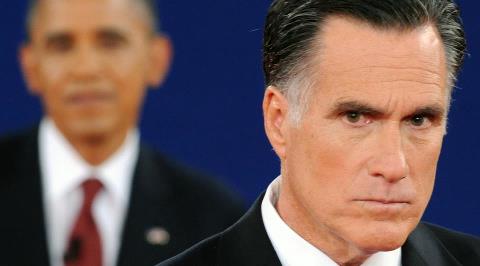 |
| If you want to know what a man’s like, take a good look at how he treats his inferiors, not his equals. Sirius Black |
They say you can judge the true character of a leader by how he behaves toward those who have served under him when times are tough. Most of us agree that a man who stands tall and generously thanks those who stood by him in defeat is a man with integrity. John McCain is one such man. But even more revealing, sometimes, is how a man behaves when he has achieved a cherished goal with the help of many others. When the temptation to see himself as a conquering hero must be very great, a man who shares the credit for victory - indeed who gives the credit almost entirely to his supporters - is rightly regarded as a man of sterling character. A truly great leader has no need to stand on the backs of other people and declare himself a self-made man. A great leader - a great president - has the quiet confidence and steady character that allows the generousness of spirit to show appreciation for the aid that all great leaders receive from other people along his way. By his example this week, President Barack Obama showed us what true integrity and great leadership really means.
 |
| John McCain to campaign staff: "A lost election will never mean more to me than the privilege of your faith and friendship." |
Well, hang on a minute. It is true that that is what most candidates would do after a grueling campaign. It is, after all, what most decent men and women do when they owe an enormous debt of gratitude to people without whom they could never have come close to their own ambitious goals. John McCain understood that very well and, being an honorable man, he rose to the occasion even in the face of a devastating defeat. His humble and heartfelt remarks to his gathered supporters after the 2008 election were intended to uplift and encourage them, to express his gratitude and to affirm their shared love of this country. In spite of his own crushing disappointment, Senator McCain knew his duty to his supporters - knew that in their hour of disappointment, it was his duty as a leader to show them the way forward - and he performed it willingly with grace and honor.
But in 2012, the Republican who postured as a "values" candidate exhibited no such grace or honor.
When the time came to thank the legions of tireless campaign workers who, for the better part of a year (if not longer), had lived and breathed loyalty and devotion to their candidate and his cause, Mitt Romney failed them miserably. He had a chance to step down off the stump, look his exhausted staffers in the eye and thank them for a herculean effort in the face of tremendous challenges, but the opportunity was utterly lost on the "caring" candidate. Romney's supporters gave their hearts and minds and boots on the ground - they sacrificed, their families sacrificed; their personal lives and careers were willingly put on hold for his cause - and win or lose, this was the moment for their candidate to offer them sincere gratitude and much deserved congratulations for a job well done.
 |
| Romney to campaign staff: Thanks for nothing, Suckers! "My job is not to worry about those people." Let them find their own way home. |
The contrast between Governor Romney's abrupt concession speech and his predecessor Senator McCain's gracious and patriotic remarks points belatedly to the answer to an important question: How will the candidate react under duress? Will he respond with measured grace and wisdom, or will his reaction show that he is unprepared for leadership? But it was Romney's unseemly, hasty severing of connections with his campaign workers - he literally left them in the lurch in the middle of the night! - compared to McCain's genuine appreciation of his supporters which will forever remind Americans of the stark difference in character between the last two Republican presidential candidates.
Even more pronounced is the contrast between Mitt Romney's reaction to defeat and Barack Obama's reaction to victory. Apparently under the mistaken impression that the usual rules of candidacy for the most powerful office on the planet do not apply to him, Romney refused to answer questions about his secret financial dealings or to discuss his plans for America. His barely concealed sense of entitlement to the presidency meant he was ill-prepared for the outcome of the election. When the American people declined to elect him as the 45th president, Governor Romney was visibly stunned. His subsequent response exhibited all of the suppressed rage and frustrated ambition that such hubris often entails.
In telling contrast, the incumbent Obama - taking nothing for granted - laid out his plans for the future and then asked the American people for their support. When they gave it to him on November 6th, he accepted their decision not simply as a vindication of himself, personally, but as a confirmation of the spirit of community and fairplay in America. His remarks late that night made clear that he saw the election result, not as a personal triumph, but as a victory for the country itself and for the ideals upon which it is founded. As for the test of principled leadership, President Obama's heartfelt appreciation of his supporters could not have been more revealing:
 |
| Obama to campaign staff: Thank you. You are the "source of my hope...my strength and my inspiration." |
"Whatever good we do over the next four years will pale in comparison to what you guys end up accomplishing for years and years to come and that's been my source of hope. That's why in the last four years when people ask me how do you put up with this and that, the frustrations of Washington, I just think about you, what you guys are going to do.
"That's the source of my hope, that's the source of my strength and my inspiration." President Barack Obama in a moving speech to his campaign workers, November 7, 2012.
President Obama calls Chicago home, and although that city has been unceasingly reviled by the right wing as a den of iniquity, the truth is that the 'city of broad shoulders' can lay claim to a great leader whose actions live up to the words of one of its spiritual leaders:
It is the way one treats his inferiors more than the way he treats his equals which reveals one’s real character. —Rev. Charles Bayard Miliken, Methodist Episcopal, Chicago. 1910
These final scenes of the 2012 presidential campaign highlighted the main theme underlying the ideological battle being fought on America political stage today: the question of whether success is a personal or a societal achievement. Are we all in this society together? Or are we rugged individualists whose successes and failures occur entirely separately from the privileges or disadvantages we are born into within a hugely diverse society? Are the wealthiest Americans rich because they deserve to be rich or could it be that there is an element of luck in success? Some people are luckily born into privilege, luckily born with high intelligence or exceptional abilities, luckily not struck down by illness or injury while others are unluckily born into poverty, unluckily cognitively challenged or unluckily physically disabled. Do we acknowledge that some of us begin the race for success on the starting line while a few begin life already halfway to the finish line and a few others never even make out of the locker room or do we insist that everyone starts on the same starting line and the ones who do not reach the finish line before all the prizes have been scooped up were simply not trying hard enough?
Mitt Romney and Paul Ryan made it clear that they believe that there are makers and there are takers in this world of ours; winners and moochers. Romney claimed that his tremendous wealth was the result of his own hard work alone, and not because he was born into wealth and privilege, was able to buy his way out of military service and had the backing of the most powerful and wealthy church in America. Another man born into poverty, unable to avoid being drafted to Viet Nam, a wounded veteran physically unable to avail himself of the GI bill which would have been his only possible way to afford a higher education and subsequently dependent upon public assistance for survival would be, in Romney and Ryan's worldview, a taker: a moocher who deserves to live in poverty. The failures of other people are their own fault, while their modest successes are the result of taking from their betters. Yet, the successes of a Romney or a Ryan - by their lights - are the result of their own efforts independent of the advantages they enjoyed, while their failures are the fault of the mistakes of lesser people. Those lesser people felt the sting of Mitt Romney's cold-hearted rejection on Wednesday morning.
The President, on the other hand, has a different view of the world, and in particular of this exceptionally promising country we call our United States of America, which he laid out clearly once more this week. In his Acceptance Speech early Wednesday morning, Barack Obama reminded the American people what it is that he believes makes this country great:
This country has more wealth than any nation, but that's not what makes us rich. We have the most powerful military in history, but that's not what makes us strong. Our universities, our culture are all the envy of the world, but that's not what keeps the world coming to our shores.
What makes America exceptional are the bonds that hold together the most diverse nation on earth. The belief that our destiny is shared; that this country only works when we accept certain obligations to one another and to future generations. The freedom which so many Americans have fought for and died for comes with responsibilities as well as rights. And among those are love and charity and duty and patriotism. That's what makes America great...
The American people made a choice on November 6.
Watch the speech again to understand just why they chose Barack Obama.






























